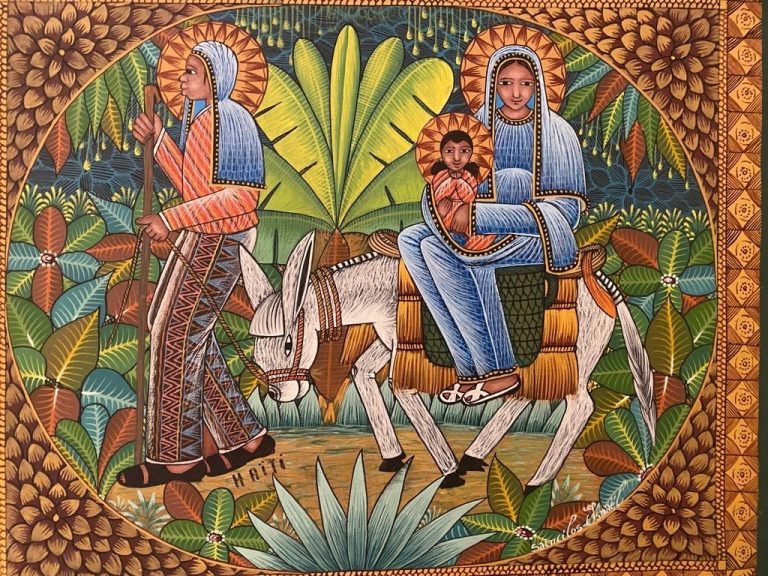Sexta-Feira da Segunda Semana da Quaresma
A história que permeia as escrituras durante a Quaresma é a do Êxodo. Eu a estudei durante muitos anos e às vezes me canso dela – especialmente quando me lembro de que ela é puramente mítica na medida em que não há registro histórico em nenhum lugar. Nunca me importei com os elementos mágicos ou sobrenaturais – dividir o Mar Vermelho, Moisés batendo no rochedo ou Deus enviando o maná para alimentar o seu povo no deserto. Estes elementos têm um nível de significado profundo e satisfatório. Assim como tem significado a constante falta de fé dos Israelitas e o pobre Moisés tendo que manter a moral do povo em alta com a ajuda de Deus. No ano passado, eu estive no Monte Nebo “na terra do Moabe”, onde Moisés viu a Terra Prometida e escutou de Deus que, por ter duvidado, ele nunca atravessaria o Rio Jordão. Isso parece um pouco severo da parte de Deus mas é dolorosamente realista. Nós nunca alcançamos a Terra Prometida nesta vida. Quando achamos que conseguimos, logo nos desiludimos.
Portanto, apesar do livro do Êxodo ser muito familiar e talvez preferimos pular esta leitura, ele ainda tem o poder de prender o leitor e de nos ensinar algo novo. Recentemente me interessei em ler uma interpretação que via o Êxodo como uma história de protesto contra a escravidão como instituição social: o elemento divino seria a afirmação da dignidade humana universal. O fato de que os escravos encaram a liberdade como um transtorno e, em alguns momentos, querem voltar à escravidão torna esta teoria muito convincente do ponto de vista psicológico.
As crianças adoram histórias conhecidas antes de dormir, assim como culturas que se estendem por milênios. Humanos pensam através de histórias. Sobrecarregados por dados e opiniões, nós criamos histórias como uma válvula de escape, até mesmo uma teoria da conspiração que qualquer tolo pode entender. Para persuadir as pessoas, conte a elas uma história, não mostre gráficos. Nós sonhamos em histórias. Como as criamos de maneira tão fácil e reagimos a elas de forma amedrontada ou empolgada – e, no entanto, é tão difícil de contar novamente uma história a alguém sem que ela pareça trivial ou boba? Nós nos recordamos em histórias ainda que tenhamos que distorcer os fatos ao contá-las.
As histórias nos conectam. Nós criamos uma ligação e uma identidade através delas. Elas então tornam-se não apenas a minha história mas a nossa história na qual nos encontramos a nós mesmos e também um ao outro. Os torcedores de futebol compartilham histórias dos seus times. Os Judeus encontram esta ligação especialmente no Êxodo (e no Holocausto) e os Cristãos ao contar novamente a história e as histórias de Cristo ao longo do ano e de suas últimas horas durante a Páscoa. Por meio da contação de histórias ao longo de grandes períodos de tempo, algo é absorvido de forma profunda em nossa consciência e, então, destilado como uma verdade vivenciada que não pode ser narrada mas tampouco pode ser negada.
Portanto, mesmo quando você pensa “Ah, já escutei isso antes. Conte-me uma nova”, lembre-se do que Jesus disse sobre o vinho na festa de casamento: “o velho é melhor”, ele disse. De fato, as histórias de toda cultura conhecida compartilham uma estrutura de narrativa universal. Alguém tem que realizar algo, existem desafios que devem ser superados e finalmente o objetivo é alcançado e a pessoa volta para casa. Como uma ida às lojas ou um heroi em uma jornada ou Deus tornando-se Homem.
Nós tomamos conhecimento de Jesus através de uma história frequentemente repetida mas também como uma história que, não importa o quão elevada, é misteriosamente reconhecível e similar à minha história. Não é uma coincidência que Jesus era também um mestre em contar histórias – como veremos amanhã.
Texto original
Friday Second Week of Lent
The story that runs through scripture during Lent is of course the Exodus. I have followed it many years and sometimes get tired of it, especially when I remember it is purely mythical in the sense that there is no historical record of it anywhere. I never minded the supernatural or magical elements – dividing the Red Sea, Moses striking the rock or God sending manna to feed them in the desert. These have deep, satisfying levels of meaning. As does the constant lack of faith among the Israelites and poor Moses having to keep up their morale with God’s help. Last year, I stood on Mount Nebo ‘in the land of Moab’, where Moses stood viewing the Promised Land and learned from God that, because he had doubted, he would never cross the Jordan himself. This seems a bit harsh of God but it’s painfully realistic. We never reach the Promised Land in this life. When we think we do, we are soon disillusioned.
So, although Exodus is over-familiar and we might prefer to skip it, it still has power to grip and teach us something new. Recently I was interested to read an interpretation that saw it as the earliest story protest against slavery as a social institution: the divine element in it was the affirmation of universal human dignity. The fact that the escaped slaves find freedom a burden and at times want to go back makes it psychologically very convincing.
Children love familiar stories when they go to sleep and so do cultures that stretch over millennia. Humans think in stories. Overwhelmed by data or opinion we revert to making up a story, even a conspiracy theory any fool can understand. To persuade people about something tell them a story, don’t show them graphs. We dream in stories. How do we put them together so effortlessly and feel them so terrifying or blissful – and yet so difficult to recount to someone else without making them sound trivial or silly? We remember in stories even if we twist the facts in the re-telling.
Stories connect us. We bond and find an identity through them. They then become not just my but our story in which we find ourselves and meet each other. Football supporters share stories of their team. Jews find this bond especially in Exodus (and the Holocaust) and Christians in the re-telling of the story and stories of Christ through the year and of his last hours during Easter. Through the storytelling over long stretches of time something soaks deep into our consciousness and distils as an experienced truth that cannot be narrated but nor can it be denied.
So, even when you think ‘O, I’ve heard that before. Tell me a new one’, just remember Jesus on wine at the wedding feast: ‘the old is good’, he said. In fact, the stories of every known culture share a universal narrative structure. Someone has something to achieve, they face obstacles which they overcome, finally they achieve and return home. Like a trip to the shops or a hero on a quest or God becoming Man.
We come to know Jesus through a story oft-repeated but also as a story which, however elevated, is recognisably mysteriously akin to my story too. It’s not a coincidence that Jesus was also a master story-teller – as we shall see tomorrow.






